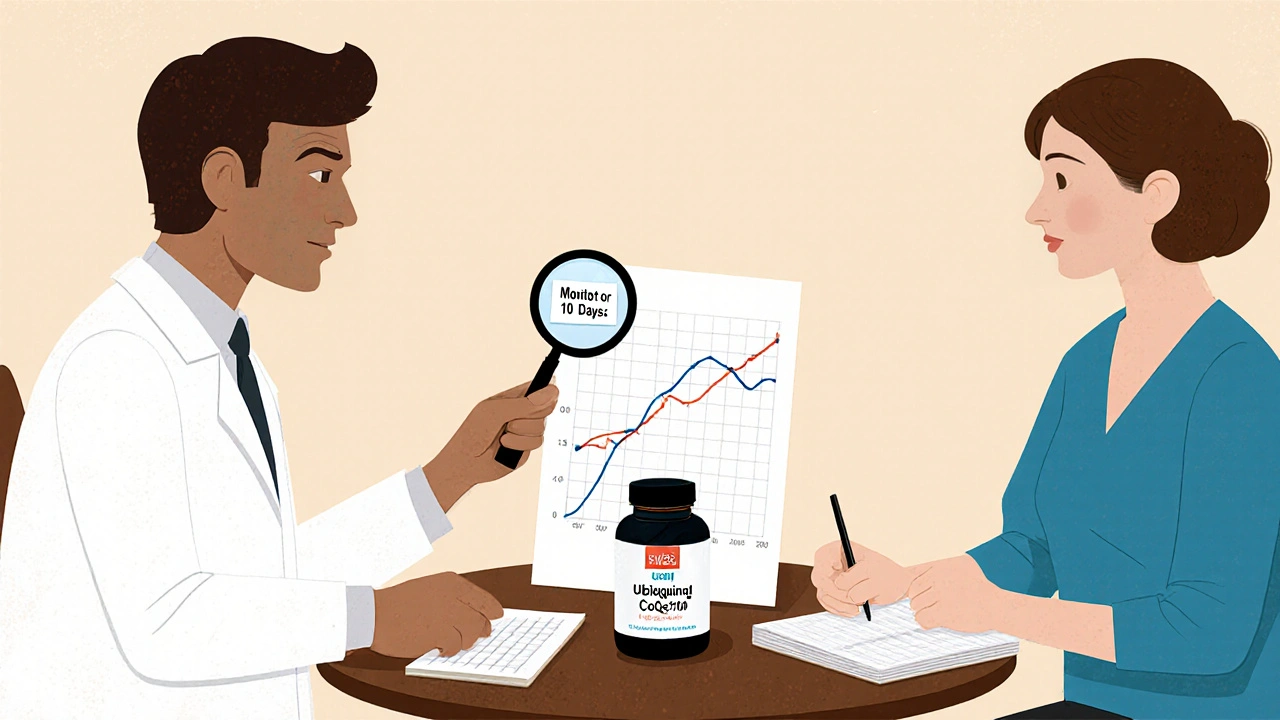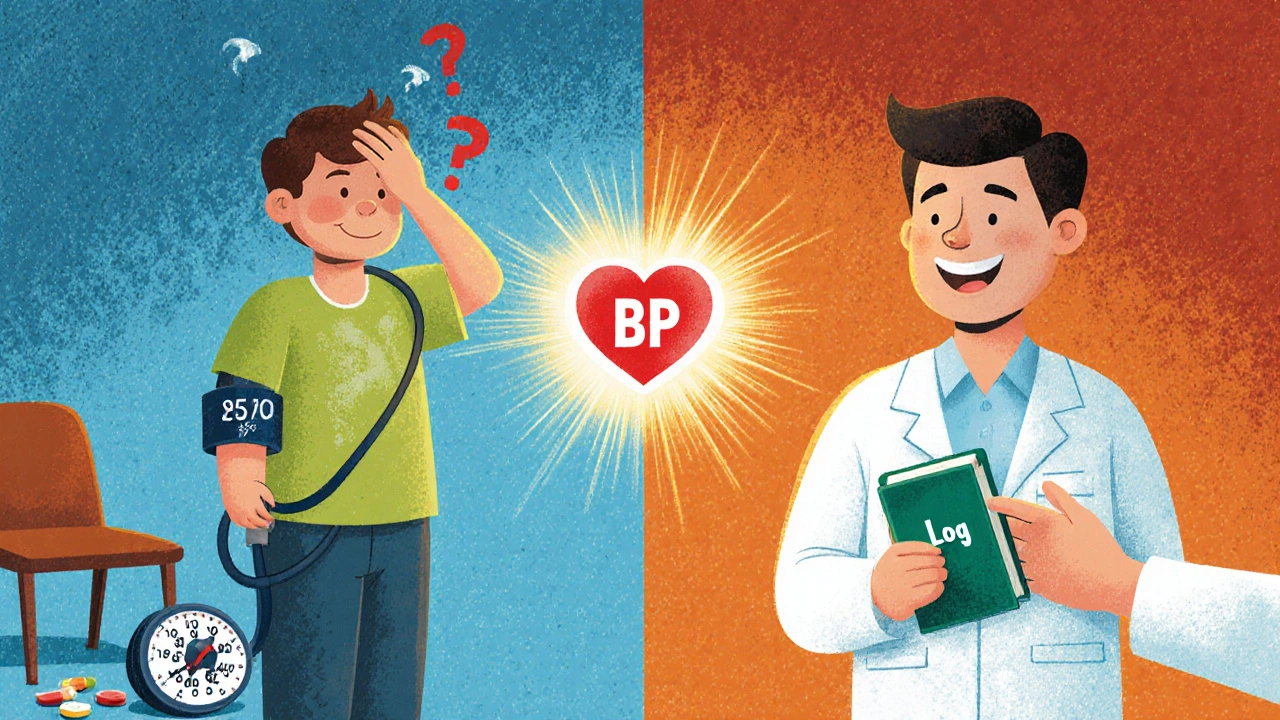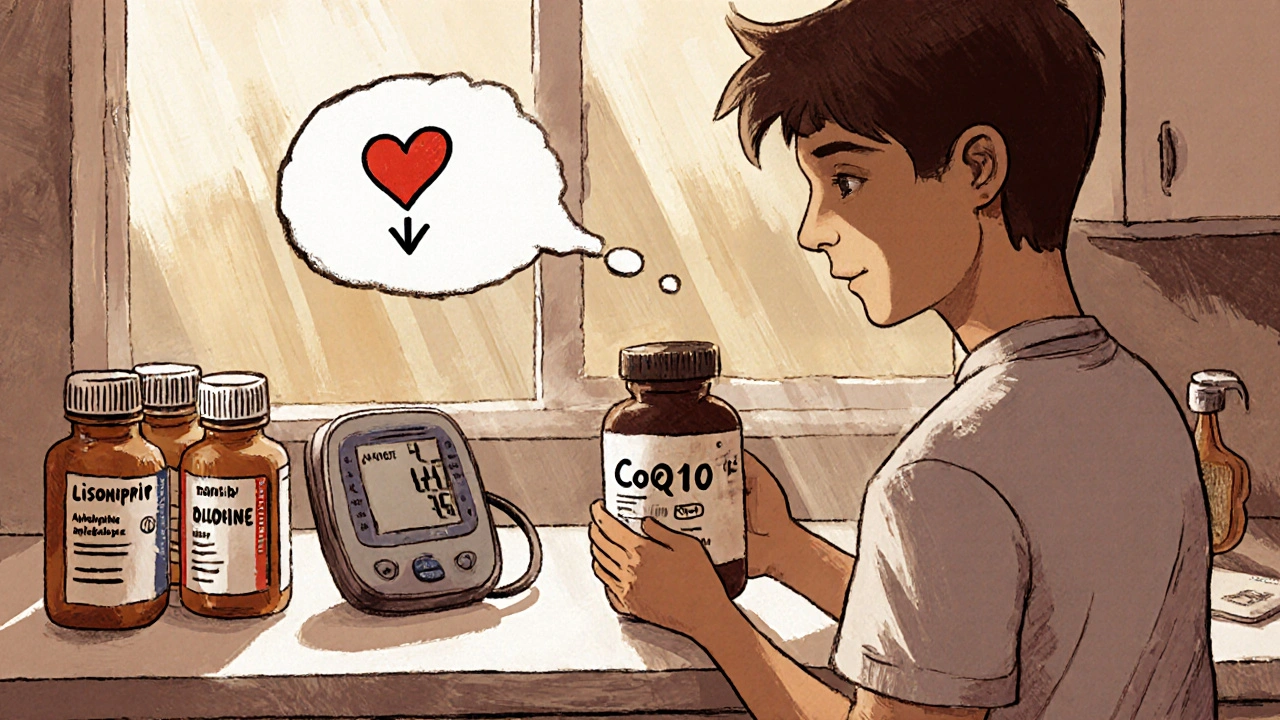When you're managing high blood pressure, every pill matters. You’ve got your prescriptions down to a routine-morning meds, evening checks, regular doctor visits. Then someone suggests adding Coenzyme Q10, a supplement you’ve seen advertised for energy, heart health, or statin side effects. Sounds harmless, right? But here’s the real question: Coenzyme Q10 and blood pressure medications-do they work together, or could they make things worse?
What Coenzyme Q10 Actually Does in Your Body
Coenzyme Q10 (CoQ10) isn’t some trendy new compound. It’s a natural substance your body makes, found in every cell, especially in your heart, liver, and kidneys. Its job? Help your cells produce energy. Think of it like a spark plug in your car’s engine-without it, things sputter. It’s also an antioxidant, which means it fights off damage from free radicals, the kind linked to aging and chronic disease.
There are two forms: ubiquinone (the oxidized version) and ubiquinol (the reduced, active form). Ubiquinol is easier for your body to absorb, especially as you age or if you’re on statins. Most supplements contain 30 to 600 mg per dose. Studies show that after 12 weeks of taking 100-200 mg daily, blood levels of CoQ10 can jump from around 0.5 μg/mL to nearly 2.7 μg/mL. That’s a big change.
The Blood Pressure Connection: Does It Really Work?
Here’s where things get messy. Some studies say CoQ10 lowers blood pressure. Others say it doesn’t. The confusion comes down to quality, dosage, and duration.
A 2019 meta-analysis of 43 trials found that CoQ10 reduced systolic blood pressure by an average of 3.5 mmHg. That might not sound like much, but for someone with borderline hypertension, it could mean avoiding a second medication. The effect was stronger when people took less than 200 mg a day and when they stuck with it for more than eight weeks. One study from 1990 showed a drop of nearly 18 mmHg in systolic pressure over 12 weeks-but that study had flaws, so later reviews didn’t count it.
Then there’s the Cochrane Review, often seen as the gold standard. It looked at just two high-quality trials and concluded CoQ10 doesn’t have a clinically meaningful effect on blood pressure. So which do you believe? The answer: it depends. The evidence isn’t strong enough for doctors to recommend it as a treatment-but it’s also not strong enough to say it’s useless.
How CoQ10 Might Interact With Your Blood Pressure Pills
CoQ10 doesn’t work like a drug. It doesn’t block liver enzymes or change how your body breaks down medications. So no, it won’t cause the same kind of dangerous interactions as grapefruit juice or St. John’s wort. But that doesn’t mean it’s safe to toss into your routine without thinking.
The real risk? Additive effects. If you’re on lisinopril, amlodipine, or hydrochlorothiazide-and you start taking CoQ10-you might end up with blood pressure that drops too low. One case report from Medscape described a patient whose systolic pressure plunged to 85 mmHg after combining 300 mg of CoQ10 with two blood pressure meds. That’s dangerously low. Symptoms? Dizziness, fatigue, fainting, even falls.
And it’s not just about pressure. CoQ10 may interfere with warfarin, a blood thinner. Case reports show it can lower INR levels by 15-25%, meaning your blood might clot more easily. If you’re on warfarin, this isn’t a minor issue-it’s a hospital visit waiting to happen.
There’s also evidence CoQ10 might increase exposure to nifedipine, a calcium channel blocker, by up to 47% in animal studies. That could mean stronger side effects like swelling, headaches, or low heart rate.

What Real People Are Experiencing
Online forums tell a different story than clinical trials. On Drugs.com, nearly 70% of users reported no issues combining CoQ10 with their blood pressure meds. But 22% said they felt lightheaded or dizzy-enough to ask their doctor to adjust their dose.
On Reddit, one user shared that after four months on 200 mg of CoQ10, their doctor cut their amlodipine dose in half. Another mentioned their doctor let them stop one medication entirely after CoQ10 stabilized their pressure. These aren’t outliers-they’re real people with real results.
But here’s the catch: in one 109-person study, over half of participants were able to reduce or stop at least one blood pressure drug after adding CoQ10. That’s powerful. But it also means that for some, CoQ10 isn’t just a helper-it’s a game-changer. And that’s exactly why you need medical supervision.
What Doctors Actually Recommend
Most guidelines don’t endorse CoQ10 for high blood pressure. The American Heart Association says the evidence is insufficient. The European Society of Cardiology calls it "promising but inconsistent." But in practice, many doctors are open to it-if you’re careful.
The Cleveland Clinic advises monitoring your blood pressure twice a week when you start CoQ10. Why? Because the effect kicks in fast-often within 10 to 14 days. If your pressure drops too far, you need to catch it before you end up in the ER.
They also recommend starting low: 100-200 mg per day, taken with a meal that has fat. CoQ10 is fat-soluble, so swallowing a pill on an empty stomach means you’re wasting most of it. And don’t mix it with multiple new meds at once. Introduce one thing at a time so you know what’s causing any changes.

Who Should Avoid CoQ10 With Blood Pressure Meds
Not everyone should try this. Avoid CoQ10 if you’re:
- On warfarin or other blood thinners (risk of clotting)
- Already have very low blood pressure (under 90/60)
- Have kidney disease or are on dialysis (limited safety data)
- Planning surgery (CoQ10 may affect blood pressure during anesthesia)
- Under 18 or pregnant (no reliable safety data)
And if you’re on statins, you might already be low in CoQ10. Statins block the same pathway your body uses to make it. That’s why many doctors suggest CoQ10 for statin users-to reduce muscle pain. But if you’re also on blood pressure meds, you’re stacking two effects. Proceed with caution.
The Bottom Line: It’s Not a Magic Pill
CoQ10 isn’t going to replace your blood pressure medication. It’s not FDA-approved for that. But for some people, it might help lower pressure a little-and maybe even let their doctor reduce a pill. That’s not nothing.
But here’s the truth: if you’re thinking about adding CoQ10, you’re already taking your health seriously. That’s good. But don’t let supplement marketing trick you into thinking it’s risk-free. The biggest danger isn’t the supplement itself-it’s not telling your doctor.
Talk to your pharmacist or GP before you start. Bring your bottle. Show them your meds. Ask: "Could this interact with what I’m already taking?" If they say yes, ask how to monitor it. If they say no, ask why. Either way, you’re in control.
CoQ10 might help. It might not. But with the right info and the right supervision, you won’t be guessing. And that’s what matters most when your blood pressure is on the line.
Can Coenzyme Q10 replace my blood pressure medication?
No. CoQ10 is not a substitute for prescribed blood pressure medication. While some studies show it may help lower blood pressure slightly, the effect is modest and inconsistent. Stopping your medication without medical supervision can be dangerous and lead to serious health risks like stroke or heart attack. Always consult your doctor before making any changes to your treatment plan.
How long does it take for CoQ10 to affect blood pressure?
Most people start to see changes in blood pressure within 10 to 14 days of daily supplementation. The full effect usually takes 4 to 8 weeks. This is why it’s important to monitor your pressure closely during the first few weeks-especially if you’re already on medication. Don’t wait months to check; early adjustments can prevent complications.
Is there a preferred form of CoQ10 for blood pressure?
Yes. The reduced form, called ubiquinol, is better absorbed than ubiquinone-especially in older adults or those on statins. Studies show ubiquinol can deliver 2 to 4 times higher blood levels at the same dose. If you’re taking CoQ10 for blood pressure or heart health, choose ubiquinol. It’s more expensive, but you may need a lower dose to get the same effect.
Can CoQ10 interact with other medications besides blood pressure drugs?
Yes. CoQ10 may reduce the effectiveness of warfarin (Coumadin), increasing the risk of blood clots. It may also interfere with certain chemotherapy drugs and insulin, though evidence is limited. Always tell your doctor about every supplement you take, even if you think it’s "natural" or "harmless." Many drug interactions are silent-no symptoms until something goes wrong.
What’s the safest dose of CoQ10 to take with blood pressure meds?
Start with 100-200 mg per day, taken with a fatty meal to improve absorption. Higher doses (300 mg or more) increase the risk of additive blood pressure-lowering effects and side effects like nausea or insomnia. Avoid exceeding 300 mg daily without medical supervision. If you’re on multiple blood pressure medications, your doctor may recommend starting at 100 mg and monitoring your pressure for a week before deciding whether to increase.
What to Do Next
If you’re considering CoQ10, don’t just buy it off the shelf. Schedule a quick chat with your pharmacist or doctor. Bring your current medication list-every pill, patch, and supplement. Ask: "Could CoQ10 affect what I’m already taking?" Then ask: "How should I monitor my blood pressure if I start it?"
Track your readings daily for the first two weeks. Use a home monitor. Write it down. If your systolic pressure drops below 90 or you feel dizzy, stop and call your doctor. Don’t wait. That’s how you stay safe.
CoQ10 isn’t the answer for everyone. But for some, it’s a quiet, supportive player in a long-term health plan. Just don’t play it alone. Work with your care team. That’s how you turn uncertainty into control.


Ramesh Deepan
Been taking CoQ10 for 6 months with my lisinopril and honestly? My BP’s steadier than ever. No dizziness, no crashes. Just smoother readings. I started at 100mg with dinner and kept it there. Doctor was skeptical but now he’s the one asking me about it. Don’t overdo it. Less is more here.
Wayne Rendall
While the anecdotal reports are compelling, the clinical evidence remains inconclusive. The Cochrane Review’s conclusion-that CoQ10 lacks clinically meaningful effects on blood pressure-is methodologically robust. Any observed reductions in systolic pressure are likely within the margin of error for home monitoring devices. Caution is warranted.
Ifeoluwa James Falola
CoQ10 helped my dad’s muscle pain from statins. Didn’t touch his BP meds. Just added it. No issues. If you’re on blood pressure pills, talk to your doc first. Simple.
Adam Phillips
So we’re all just chemicals right? Cells making energy CoQ10 is just your body’s way of saying hey i got this but then you take a pill and think you’re in control but you’re not you’re just playing god with your mitochondria
Julie Lamb
I started CoQ10 last year after my doc said it might help with my fatigue 😊 My BP actually dropped a bit but I didn’t panic-I tracked it and told my doctor. He adjusted my dose and now I feel amazing! You guys are doing great just by asking questions 💪❤️
april kakoske
Why do we always think something natural is safer? CoQ10 is made by our body but so is cortisol and that can kill you too if it’s out of balance. We don’t need more supplements we need better education and doctors who actually listen
Pradeep Meena
Indians have been using turmeric and ashwagandha for 5000 years and now you want to take some fancy American pill? This CoQ10 is just corporate scam. Your body makes it. Stop wasting money. Take real food not pills
Rishabh Jaiswal
CoQ10 is not for everyone. I took it and got a headace and my BP went to 80/50. I was dizzy for days. So dont be dumb like me. Start low and talk to your doctor. Also ubiqinol is better but its expensive so just get the cheap one and take with butter or something
May Zone skelah
Let’s be honest-this isn’t about CoQ10. It’s about our collective spiritual crisis. We’ve outsourced our health to Big Pharma and now we’re desperately grasping at molecular breadcrumbs hoping for redemption. CoQ10 is the new incense in the temple of self-help capitalism. We don’t need another supplement-we need to reconnect with our bodies, our rhythms, our ancestral wisdom. The real question isn’t whether it lowers BP-it’s whether we’ve lost the ability to heal without a prescription.
Dale Yu
Everyone’s scared to admit it but CoQ10 works. My doc told me to stop it but I didn’t listen. My pressure dropped 15 points. Now I’m off one med. You think I’m lucky? No I’m smart. You think doctors know everything? They don’t. They get paid to push pills not to think. Trust yourself. Track your numbers. Be your own advocate
Kshitij Nim
Good post. Real talk. CoQ10 isn’t magic but it’s not trash either. Start at 100mg with food. Check your BP twice a week. If it drops below 90 systolic, pause and call your doc. Don’t go full biohacker. Just be smart. You’re already ahead by reading this.